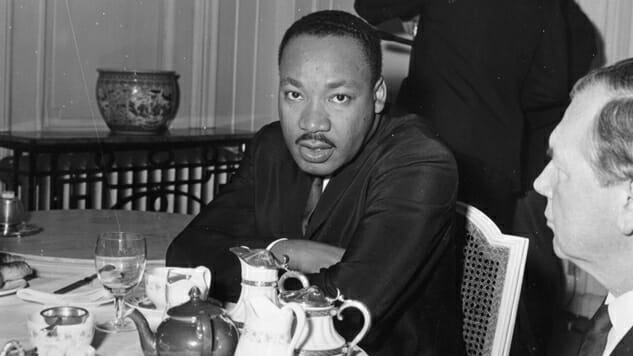Reflecting on Muhammad Ali and Dr. Martin Luther King—a Legacy of Sportsmen in Protest
Photo by William H. Alden/Getty
The political controversy surrounding the President-elect has made the 86th anniversary of Reverend Dr. Martin Luther King’s birthday even more important. In the past year, the beliefs of Donald Trump and his supporters have prompted response from the Black Lives Matter Movement, along with prominent black athletes.
Last year, Colin Kaepernick of the San Francisco 49ers took a knee during “The Star-Spangled Banner,” with many more in the NFL following his lead shortly thereafter. Serena Williams raised her fist at Wimbledon in July a week after 32-year-old Philando Castile was killed during a traffic stop by a police officer in Minnesota. They follow a long line of sports activists who support equal rights, the most famous of which is probably Muhammad Ali. His connections to the greats of the 1960s civil rights and anti-war movements are well-known, including his relationship with King.
Ali converted to Islam and changed his name from Cassius Clay in 1964, after becoming involved in the black nationalism with Malcolm X and the Nation of Islam (NOI). “The Greatest,” had just won his first of three heavyweight world championships, and was beginning to channel his unifying fame toward promoting causes he felt passionate about.
Ali openly followed the NOI in criticizing King’s marches, philosophy of integration, and non-violent demonstrations. When the public began judging his alignment with the NOI, was viewed as more radical and combative than King’s Southern Christian Leadership Conference, he defended himself.
While discussing integration of whites and African-Americans in 1964, Ali condemned King’s approach saying, “Integration is wrong. White people don’t want it, the Muslims don’t want it. So what’s wrong with the Muslims? I’ve never been in jail. I’ve never been in court. I don’t join integration marches and I never hold a sign”
But he and King found themselves on the same side when Ali refused to be conscripted into the military in 1966 as a conscientious objector. A conviction, and the stripping of his boxing titles soon followed, along with being banned from the sport altogether.
King vocally stood with Ali in his decision to refuse the draft in 1967. He told parishioners, “No matter what you think of Mr. Muhammad Ali’s religion, you certainly have to admire his courage.”
-

-

-

-

-

-

-

-

-

-

-

-

-

-

-

-

-

-

-

-

-

-

-

-

-

-

-

-

-

-

-

-

-

-

-

-

-

-

-

-








































